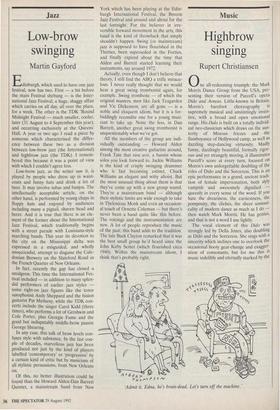Jazz
Low-brow swinging
Martin Gayford
Edinburgh, which used to have one jazz festival, now has two. First — a bit before the main Festival shebang — is the Inter- national Jazz Festival, a huge, shaggy affair which carries on all day, all over the place, for a week. The other is the TDK 'Round Midnight Festival — much smaller, cooler, later (31 August to 4 September this year), and occurring exclusively at the Queens' Hall. A year or two ago I read a piece by someone which characterised the differ- ence between these two as a division between low-brow jazz (the International) and highbrow jazz (the TDK). I remem- bered this because it was a point of view with which I couldn't agree less.
Low-brow jazz, as the writer saw it, is played by people who dress up in waist- coats and funny hats and drink a lot of beer. It may involve tubas and banjos. The intellectually acceptable article, on the other hand, is performed by young chaps in floppy hats and enjoyed by audiences including many a pigtail, shaven head and beret. And it is true that there is an ele- ment of the former about the International Jazz Festival, which traditionally begins with a street parade with Louisiana-style marching bands. This year its devotion to the city on the Mississippi delta was expressed in a misguided, and wholly unsuccessful, attempt to disguise the Cale- donian Brewery on the Slateford Road as the French Quarter of New Orleans.
In fact, recently the gap has closed a smidgeon. This time the International Fes- tival included — in addition to many splen- did performers of earlier jazz styles some right-on jazz figures like the tenor saxophonist Andy Sheppard and the fusion guitarist Pat Metheny, while the TDK con- certs include the singer Carol Kidd (three times), who performs a lot of Gershwin and Cole Porter, plus Georgie Fame and the good but indisputably middle-brow pianist George Shearing.
In any case, this talk of brow levels con- fuses style with substance. In the last cou- ple of decades, marvellous jazz has been produced not just by the kind of players labelled 'contemporary' or 'progressive' by a certain kind of critic but by musicians of all stylistic persuasions, from New Orleans on.
Of this, no better illustration could be found than the Howard Alden-Dan Barrett Quintet, a mainstream band from New
York which has been playing at the Edin- burgh International Festival, the Brecon Ja77 Festival and around and about for the last fortnight. For the believer in irre- versible forward movement in the arts, this band is the kind of throwback that simply shouldn't happen. Swing (or mainstream) jazz is supposed to have flourished in the Thirties, been superseded in the Forties, and finally expired about the time that Alden and Barrett started learning their instruments, say around 1972.
Actually, even though I don't believe that theory, I still find the ABQ a trifle miracu- lous. 1 never really thought that we would hear a great swing trombonist again, for example. Swing trombone — of which the original masters, men like Jack Teagarden and Vic Dickenson, are all gone — is a noble and eloquent idiom, but it is a for- biddingly recondite one for a young musi- cian to take up. None the less, in Dan Barrett, another great swing trombonist is unquestionably what we've got.
All the members of the group are indi- vidually outstanding — Howard Alden among the most creative guitarists around, Frank Tate that rara avis, a bassist whose solos you look forward to. Jackie Williams is the kind of crisply swinging drummer who is fast becoming extinct, Chuck Williams an elegant and witty altoist. But the most unusual thing about them is that they've come up with a new group sound. They're a mainstream band — although their stylistic limits are wide enough to take in Thelonious Monk and even an occasion- al touch of Ornette Coleman — but there's never been a band quite like this before. The voicings and the instrumentation are new. A lot of people reproduce the music of the past; this band adds to the tradition. The late Buck Clayton remarked that it was the best small group he'd heard since the John Kirby Sextet (which flourished circa 1940). Within the mainstream idiom, I think that's probably right.


















































 Previous page
Previous page